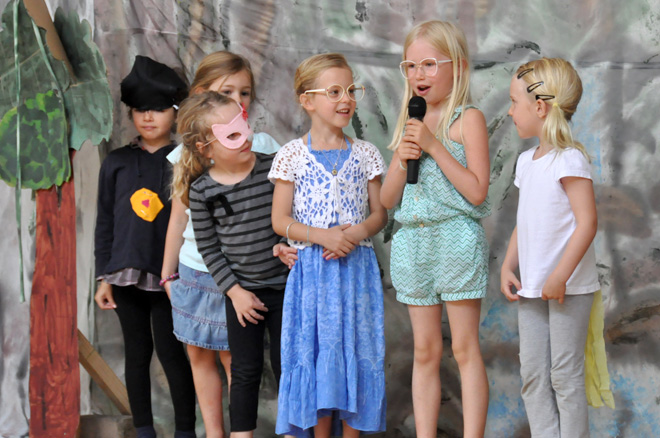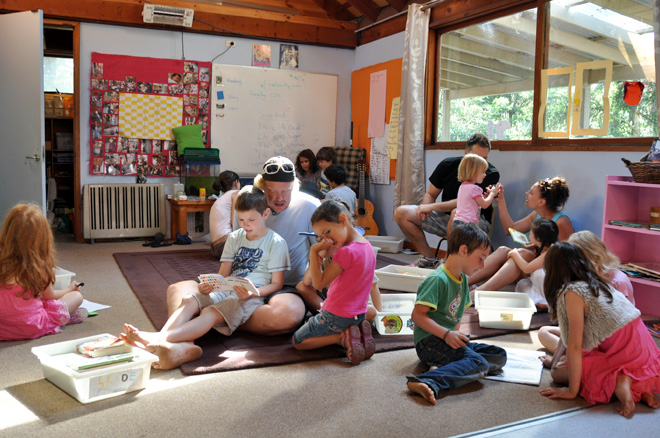Literacy
The staff and Education Committee, in consultation with outside educators, reappraise our practices in language teaching (in the light of current research findings). Presently the work of MAK Halliday and others in Genre-theory is being incorporated into our existing whole-language approach.
Teachers need to provide scaffolding for the children in their construction of meaning. The purpose for which the language is used determines the structure of the text, grammatical constructions and vocabulary choices.
Children need to have control over their own language learning and use. At Kinma children are encouraged to use their language skills broadly and imaginatively. For instance, when planning projects children present their information as reports, on video and audio tapes, through debate, as plays, dramas, enactments, as games or even as stories.
Oral
Oral and spoken genres differ greatly from written genres and children do not learn written genres in the same way they learn to speak. The awareness of relationships between the two modes is an important part of a child's learning.
Using language competently involves making decisions, from choosing the most appropriate word for speaking, reading or writing to gleaning the most critical understanding of spoken or written text.
Listening to stories, poems, myths and legends from an early age forms a foundation to a life-long love of aural and written language. As Australia develops a broader cultural base, the transmission of cultural diversity through literature is a valuable background to understanding other cultural perspectives.
At Kinma children enjoy shared storytelling and reading from staff, visiting parents and story-tellers.

Reading
Children learn to read by reading. Their reading is facilitated by being surrounded by print, having readers model reading such as watching parents read. Children need to interact with picture books and see the print as it is read to them. Gradually they will adopt the conventions of reading: looking at the cover, and turning the pages from right to left, reading along lines from left to right (in English), realising word-to-word correspondence and meaning attributed to print and pictures.
Early readers will often need help by way of explicit strategies for situations such as encountering new words. Some suggestions to make to children are:
- to read the rest of the sentence to get the meaning and then substitute a word to make sense in the context;
- look at the length of the word;
- look at the first letter;
- if the child can see the word around the room;
- or remember it from past pages read . . . etc
These are not intrinsic practices and need to be taught to the beginning reader.

Spelling
Children are encouraged to always "have-a-go" rather than stop to deliberate and agonise over the dictionary spellings of unknown words. In writing we value most the children's ideas and their written fluency so their ideas have continuity. Invented spellings are encouraged so as not to inhibit ideas flow.
At the editing stage when children, peers and/or adults go over their writing, conventional spellings and strategies for actively acquiring these are encouraged. Children will make approximations increasingly closer to conventional spellings as they mature as readers where they see the words written down.
Learning of new vocabulary and spellings is most meaningful on a child-centred "need-to-know" basis.
Handwriting
Children need to understand the value and function of writing before they will write well. They also desire to write when watching mature writers writing.
Letter formation is important to the extent that it facilitates fluent and legible writing.
Term Dates 2025
- Term 1: Tues 4 February to Fri 11 April
- Term 2: Wed 30 April to Fri 27 June
- Term 3: Wed 23 July to Fri 26 Sep
- Term 4: Wed 15 Oct to Wed 17 Dec
Term Dates 2026
- Term 1: Mon 2 Feb – Thu 2 April
- Term 2: Wed 22 April – Fri 26 June
- Term 3: Wed 22 July – Fri 25 Sep
- Term 4: Wed 14 oct – Wed 16 Dec
Contact us
127 Coolowie Rd,
Terrey Hills NSW 2084
Find us on Google Maps
Primary: +61 2 9450 0738
Preschool: +61 2 9486 3018
Email Kinma

